|
|
|
Sort Order |
|
|
|
Items / Page
|
|
|
|
|
|
|
| Srl | Item |
| 1 |
ID:
167667
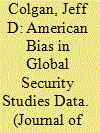

|
|
|
|
|
| Summary/Abstract |
Three major datasets contain problematic interpretative judgments, arguably biased toward the United States: the Polity dataset; Reiter and Stam's data on war outcomes; and Singh and Way's data on nuclear proliferation. These examples raise the possibility that important datasets in global security studies, and in political science more generally, are systematically affected by an American bias. Bias means that, non-Americans might code the same observations differently, on average. The issue arises because Americans, on average, seem to have certain predispositions that non-Americans, on average, do not have. Other nationalities have their own predispositions. I also demonstrate that each of the three empirical examples has significant implications for causal inferences, altering certain statistical findings based upon them. For instance, I reexamine Haber and Menaldo's study of the resource curse, showing that alternative data coding casts substantial doubt on their inferences.
|
|
|
|
|
|
|
|
|
|
|
|
|
|
|
|
| 2 |
ID:
167663
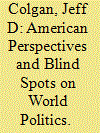

|
|
|
|
|
| Summary/Abstract |
Scholars of international relations (IR) from the United States, like any country, view the world with particular perspectives and beliefs that shape their perceptions, judgments, and worldviews. These perspectives have the potential to affect the answers to a host of important questions—in part by shaping the questions that get asked in the first place. All scholars are potentially affected by national bias, but American bias matters more than others. This special issue focuses on two issues: attention and accuracy in IR research. While previous scholarship has raised principally normative or theoretical concerns about American dominance in IR, our work is heavily empirical and engages directly with the field's mainstream neopositivist approach. The collected articles provide specific, fine-grained examples of how American perspectives matter for IR, using evidence from survey experiments, quantitative datasets, and more. Our evidence suggests that American perspectives, left unexamined, negatively affect our field's research. Still, the essays in this special issue remain bullish about the field's neopositivist project overall. We also offer concrete steps for taking on the problems we identify, and improving our field's scholarship.
|
|
|
|
|
|
|
|
|
|
|
|
|
|
|
|
| 3 |
ID:
167665
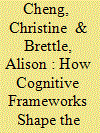

|
|
|
|
|
| Summary/Abstract |
Why do American perspectives of international relations (IR) continue to hold sway over an increasingly diverse discipline? What actually constitutes “Americanness” in IR? Who is considered “American” in IR? These are the central questions we explore in this essay. Drawing on cognitive and behavioral insights from social psychology, we argue that there is a distinct “American approach” to international relations and security studies and that this approach is a product of Western cognitive frames. We identify three factors that represent the American approach's hyper-Westernized framing: individualism, equality, and a preference for causal rather than contextual analysis, and a preference for egalitarianism. We argue that these are reinforced by two social identity processes—academic identity and national identity. The consequences of “being American” in IR and security studies suggest not only problems of attention and accuracy, but an inherent failure to appreciate that Western—and particularly, American—ways of seeing and valuing the world are not universal.
|
|
|
|
|
|
|
|
|
|
|
|
|
|
|
|
| 4 |
ID:
167668


|
|
|
|
|
| Summary/Abstract |
As noted by other contributions to this special issue, an American perspective shapes many leading quantitative datasets used by international relations scholars. This tendency can lead to biased inferences, but it can also enhance scholarly accuracy under certain conditions. Precisely because some datasets reflect national perspectives, they are appropriate to use when seeking to test theories in which the actors of interest subscribe to the same national perspective. This argument is illustrated with the case of US democracy assistance. Using an appropriate measure of democracy reveals that—contrary to some claims in the literature—US policy-makers allocate democracy assistance in ways that reflect their perceptions of countries’ regime types, giving less democracy assistance to countries that they perceive as more democratic.
|
|
|
|
|
|
|
|
|
|
|
|
|
|
|
|
| 5 |
ID:
167669
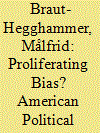

|
|
|
|
|
| Summary/Abstract |
This article examines whether there is a US bias affecting how American political scientist study nuclear weapons and their effects. US dominance in the production and dissemination of political science literature on nuclear weapons is reflected in concepts and theories of their spread and use, as well as prominent datasets on nuclear proliferation. More broadly, is there a US bias in scholarship on nuclear weapons produced by American political scientist? In this article I examine whether there is a US bias that affects what is studied, what kinds of questions are asked and what cases are examined, and how the evidence is interpreted.
|
|
|
|
|
|
|
|
|
|
|
|
|
|
|
|
| 6 |
ID:
167666


|
|
|
|
|
| Summary/Abstract |
How do the limitations of the American perspective in international relations (IR) affect the accuracy of theorizing? We show that assumptions about the relationship between domestic and international politics that underlie significant segments of American IR scholarship are unwarranted. Publics around the world do not respond to United Nations’ and other intergovernmental organizations’ criticism of their governments in the same way that Americans do. Publics are not universally poorly informed of their country's foreign policies, and they are not equally skeptical of the value of using force for resolving disputes with other states. We demonstrate the limitations of US-based scholarship using new and unique survey data from the United States and other countries. We then address how these US-centric assumptions skew certain IR literatures and limit important research agendas pursued by American scholars.
|
|
|
|
|
|
|
|
|
|
|
|
|
|
|
|
| 7 |
ID:
167670


|
|
|
|
|
| Summary/Abstract |
Scholars have been particularly hampered in their explanations and understanding of Asian security because they often learn little about Asia in their graduate training. The international relations (IR) literature draws an overwhelming proportion of its empirical source material from the European historical experience. We show that the curricula and training that graduate students of international relations receive in the United States are overwhelmingly focused on European examples. In short, the median American scholar of IR is deeply comfortable with European examples and analogies and has almost no exposure to Asian examples and history. Thus, when faced with Asian examples, they are considered within the context they are taught: through the European lens. We conclude with a call for greater attention to the empirical reality that is Asia.
|
|
|
|
|
|
|
|
|
|
|
|
|
|
|
|
| 8 |
ID:
167671
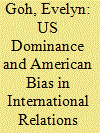

|
|
|
|
|
| Summary/Abstract |
This article responds to the Journal of Global Security Studies special issue on “American Perspectives and Blind Spots on World Politics,” edited by Jeff Colgan. It applauds their significant achievement in offering positivist demonstrations of the bias generated by American assumptions, coding, and preferences, and quantitative demonstration of the systemic and systematic impact of this bias in skewing key assumptions and theories in mainstream US international relations (IR), by selectivizing attention and compromising accuracy. The article pushes the envelope further by arguing that the call to arms is more urgent and more significant than Colgan et al. express. As US hegemony is diluted, the discipline of IR must increasingly account for other parts of the world. Here, cultural bias generates deeper problems with both ontology and epistemology. The article reviews the wider IR field that shows how IR is at once more global and less easily generalizable, driving the imperative to expand the universe of cases for qualitative research. It warns that the problem of US bias and the wider issue of insularity is accentuated by the growing distance between IR scholarship as expressed in top journal publications and “real-world” puzzles and empirical reality—and by ongoing changes in how governments provide state support and funding for IR research and training.
|
|
|
|
|
|
|
|
|
|
|
|
|
|
|
|
| 9 |
ID:
167664


|
|
|
|
|
| Summary/Abstract |
This article investigates the factors that affect scholarly attention on particular countries in four major international relations (IR) journals: International Studies Quarterly, International Organization, International Security, and World Politics for the period 1970 to the present. The analysis supports three basic conclusions. First, the United States receives the most scholarly attention in leading IR journals by a large margin. Second, a baseline model of scholarly attention, including just population, gross domestic product (GDP), and a dummy for the United States fits the data rather well. Additional factors such as membership in prominent international organizations or involvement in armed conflicts improve model fit, but only marginally, with little evidence of regional or English-language bias. And third, there is only weak evidence that countries with stronger economic and security linkages with the United States receive more attention. However, Israel and Taiwan—two countries with unique security relationships with the United States—receive more scholarly attention than either the baseline or augmented models would predict. Our analysis of bibliometric data from leading IR journals indicates the United States is the three-hundred-thousand-pound blue whale of IR scholarship. However, this emphasis is not particularly outsized when its large population, economy, and its extensive history of participation in interstate wars are taken into account.
|
|
|
|
|
|
|
|
|
|
|
|
|
|
|
|
|
|
|
|
|